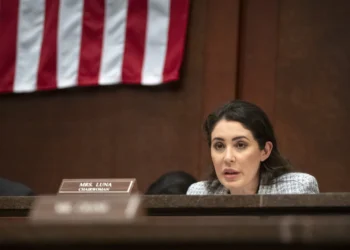From the moment Donald Trump announced his run for president, the Republican establishment hated his guts. In 2016, the brash New York billionaire was treated like a joke — an embarrassment degrading the political process. But as Trump gained momentum, establishment figures faced a choice: Throw in with “NeverTrump” or pretend they’d seen the light.
Some bolted to NeverTrump outfits like the Bulwark or the Lincoln Project. Others stuck around, biding their time, waiting for a chance to reclaim the party from the populists. Now that Trump defines the GOP, they’ve shifted strategies. If you can’t beat MAGA, co-opt it.
MAGA has never been a cult, despite what the detractors may say. Supporters have stood by him because he fought for the things they care about.
Trump’s first term resembled an awkward arranged marriage. He won the heart of the base and created a movement mostly detached from the GOP machine. But he lacked the institutional infrastructure necessary to govern. Running the executive branch requires armies of staffers, bureaucrats, and loyal operatives — none of which MAGA had.
That vacuum was filled by GOP establishment swamp creatures, many of whom actively opposed the president and his agenda. Key officials undermined him. Military leaders lied to his face. Despite some major victories, Trump’s presidency was defined by a constant war against a hostile ruling class.
The great Republican hope?
With outrageous legal attacks from the Biden administration raising doubts about Trump’s electability, Ron DeSantis was encouraged to step in. I like DeSantis — he’s my governor, and he has done an outstanding job, especially standing up to the COVID-19 insanity. But the truth is that DeSantis has never been a gifted campaigner. He barely scraped by in 2018 against a man later found doing meth in a hotel with a male prostitute.
Trump, whatever his flaws, is a force of nature on the campaign trail. Anyone paying attention could see that DeSantis was walking into a meat grinder.
Still, many Republicans who hadn’t declared themselves NeverTrump saw DeSantis as their chance to strike. He had a solid record and stuck closer to the establishment line. He was more disciplined, less prone to off-script rhetoric, and — most important — not under indictment.
So the donor class and the consultant class threw their weight behind him. The money flowed, the media declared him the future, and the campaign … flopped. Hard.
After DeSantis’ inevitable loss, anti-Trump Republicans were left stunned, tending to their bruised egos and looking for a new angle. Trump had survived an assassination attempt and beaten Kamala Harris. It was clear: He was the party. The idea that he could be swapped out for a more polished Republican was delusional.
Strain on the base
MAGA wasn’t going to be defeated by recycled talk about small government and lower taxes. The only remaining play was to redefine the movement from within.
Trump’s second term began with a burst of action: government agencies were shuttered, birthright citizenship was challenged, and deportations resumed. MAGA supporters were elated. Progressives were stunned. But the GOP establishment was left wondering how to reinsert itself into power.
Then came the cracks.
Trump ordered a strike on Iran at Israel’s request — only for Benjamin Netanyahu to blow off the president’s social media appeals to honor a ceasefire. Trump floated amnesty for illegal aliens working in agriculture and hospitality. The Justice Department and FBI dismissed any suggestion that Jeffrey Epstein had blackmailed elites, was murdered, or left behind a client list.
This was especially disturbing given that Attorney General Pam Bondi and FBI Director Kash Patel had built their MAGA reputations by promising to expose Epstein’s secrets. Suddenly, the story changed. The fabled “client list” did not exist after all. The “truckload” of evidence amounted to nothing. Cover-up? What cover-up?
The strain on Trump’s relationship with his base was real — and that was the opening establishment Republicans needed.
RELATED: Progressive castoffs don’t get to define the right

Enter ‘neo-MAGA’
Out of nowhere, a new class of Trump supporter emerged: neo-MAGA. Most of these operatives were DeSantis die-hards last year. Now they claim to be Trump’s most loyal defenders. They spend their time lecturing actual Trump supporters for lacking faith in a man they previously ridiculed.
In their telling, MAGA never meant ending regime-change wars — it meant launching new ones in Iran. MAGA never meant deporting illegal aliens — it was just about gang members and drug traffickers. MAGA never cared about Epstein’s client list, so don’t worry about it. Just trust the process. Trust the staff. Trust the people who said the files were real and now insist they were imaginary.
The “trust the staff” line is especially rich, considering that many of these same influencers trashed Trump’s appointment of Steve Witkoff as a negotiator for not being sufficiently pro-Israel. Now they demand blind loyalty to the very people they attacked last week.
This isn’t about loyalty to Trump. MAGA has never been a cult, despite what the detractors may say. Supporters have stood by him because he fought for the things they care about: economic populism, national sovereignty, immigration, and a restrained foreign policy. When he delivers, they cheer. When he falters, they push back.
Neo-MAGA wants to replace that dynamic with a new one — one where dissent is heresy and the old GOP agenda returns under a different label. These operatives see a chance to ride the MAGA brand back into power, reshaping it into something safer, softer, and friendlier to the donor class.
But the base haven’t forgotten. They remember who bolted. They remember who mocked them. They remember who told them DeSantis was the future. And they know that the same people now preaching unity were, until five minutes ago, rooting for Trump to fail.
Whatever disagreement exists between Trump and his base, both should beware of the interlopers trying to turn this moment into a reset for the GOP establishment. MAGA wasn’t built on loyalty to staffers or influencers. It was built on promises, and those promises still matter.















